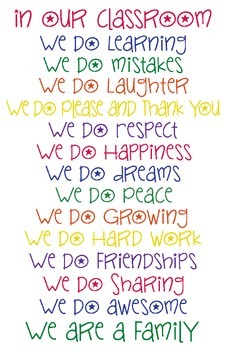Social
and Emotional Learning (SEL) is the concept of teaching students how to handle
their own emotions in a positive, healthy way. SEL also teaches students how to
read and deal when other's emotions differ from their own. Students who are
introduced to SEL at an early age become more aware of their emotions, which
promotes longer lasting relationships, friendships, and an increase in success. It
is important to teach students the steps to take before reacting to a problem.
First, they should stop. Stopping allows the student to step away from
the stressor. Next, they should take a deep breath. Deep breathing calms
the mind and rids it of all negative thoughts. Then, the student should think.
Students should think about the situation. Is it major? Minor? Is it harmful to
me or others? Lastly, the student should act. The students should act on
the situation in a healthy, positive way.
There
are many strategies a teacher can implement in the classroom that promotes Social
Emotional Learning. Several ways to incorporate SEL in the classroom is by
providing “daily check-ins.” Daily check-ins allow the students the opportunity
to express any concerns, thoughts, victories, or losses they may have encountered
throughout the week. By setting aside a time to interact with the students, the
teacher becomes aware of what is going on in the lives of his/her students. The
teacher then knows what each student needs; therefore, he/she can take the time
to have a one-on-one, personal interaction with the student. Another way to
incorporate an SEL strategy in the classroom is to have a “Morning Greeting
Board.” This is where the teacher greets each student individually at the door
with a hug, high-five, fist-bump, or smile. This activity provides love and
attention to every student. This idea shows the students they are loved, valued,
cared for, and safe.
| Morning Greetings! |
 |
| SEL |
One
way to make the students feel safe is to include a designated safe place
in the classroom. This is an area set aside and away from peers. Here, the
student can unwind in a calm, healthy, positive way. Coloring sheets, stuffed
animals, breathing exercises, and picture cards are a few tools that can be
found in the safe place to help students relax. Picture cards are a great
tool to use because sometimes students do not have the words to express what they
are feeling. As a result, you can use pictures of faces showing different emotions
for the students to point at, so you as the teacher know what they are feeling. Another
great tool to help aid in Conscious Discipline is calm down bottles. Calm down
bottles are bottles filled with liquid and a variety of objects. Objects can be
things that interest the students, such as: glitter, stars, unicorns, hearts, insects,
sports balls, animals, etc. These can either be included inside the safe place,
or each student can create their own. Calm down bottles would be a great craft
to make with the class at the beginning of the year to help build unity and
community. Students could start their day with sixty-seconds of reflection and
use the calm down bottle as a tool to clear their minds and regain focus. Students
could also start their day with “I love you rituals” and deep breathing
exercises. These strategies are small, yet so powerful.
 |
| We are FAMILY! |
| When you are overwhelmed, be a STAR! |
I believe that Social and Emotional learning and Conscious Discipline are both great strategies to implement into any classroom. Once students understand their own emotions and social interactions, they will be able to communicate with society in a positive and meaningful way. They will be able to have strong relationships and handle confrontation in appropriate ways because both policies incorporate conflict-resolution strategies. I was surprised to see how these two strategies will benefit students once they are out of the classroom and into the workforce because both implement problem-solving skills. Students will become successful members of society after learning how to handle their and other’s emotional differences. Conscious Discipline is an awesome mechanism to use because it provides students with tools and strategies to use when they become overwhelmed. It is also making students become aware of their behavior. They know that the teacher wants to keep them safe, but in order for that to happen, they must redirect their behavior/emotion and remain safe.

No comments:
Post a Comment